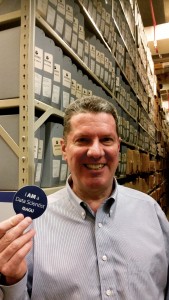14 January 2016
Data Management Isn’t Optional; It’s Essential to Being Successful
Posted by lhwang

John Bates, Principal Scientist for Remote Sensing at the NOAA’s National Climatic Data Center, stands in front of rows of physical climate records.
Credit: John Bates
This is part of a new series of posts that highlight the importance of Earth and space science data and its contributions to society. Posts in this series showcase data facilities and data scientists; explain how Earth and space science data is collected, managed and used; explore what this data tells us about the planet; and delve into the challenges and issues involved in managing and using data. This series is intended to demystify Earth and space science data, and share how this data shapes our understanding of the world.
By Rebecca Fowler
John Bates is Principal Scientist for Remote Sensing at the National Centers for Environmental Information of the U.S. National Oceanic and Atmospheric Administration/National Environmental Satellite Data and Information Service (NOAA/NESDIS). His research interests focus on the use of operational and research satellite data to study the global water cycle and studying interactions of the ocean and atmosphere. Bates is Chair of the Committee on Earth Observation Satellites-Coordination Group for Meteorological Satellites Joint Working Group on Climate and serves on the American Geophysical Union (AGU) Board of Directors.
Here Bates reflects on his experience with data management and how he became an advocate for Earth and space science data management activities.
_____________________________________________________________________________________________________________________________________
As an observationalist who has worked with digital satellite data for 35 years, I’ve learned that data management isn’t optional; it’s essential to being successful in science.
My first experience with digital satellite data was through the Man computer Interactive Data Access System (McIDAS), which I was introduced to when I began graduate school at the University of Wisconsin–Madison in 1980. McIDAS was, and still is, a cutting edge blend of science-technology-data management. My experience with McIDAS put me on a career track where this principle and trifecta of innovation played a central role, and remain key to my getting science done.
Another key lesson in data management came from my postdoctoral work at Scripps Institution of Oceanography, where we had a satellite direct readout site. Commercial packages to process the direct readout data were expensive and did not process the satellite temperature and moisture vertical profile data. Fortunately, the satellite group under Professor Bill Smith at the University of Wisconsin-Madison had developed a processing package they freely distributed. This was decades before the term ‘freeware’ became popular and researchers using the package openly shared tips on using it. Thus, a second career-guiding principle on data management was forged; be open, generous, and transparent in the use of software and data.
These principles guided my career and led me to become a strong advocate for the AGU initiatives on data. I’m proud that in September 2014, the AGU Board of Directors approved two initiatives to help the Earth and space sciences community address the growing challenges accompanying the increasing size and complexity of data. These initiatives are: Data Science Credentialing, the development of a continuing education and professional certification program to help scientists in their careers and to meet growing responsibilities and requirements around data science.The second is the Data Management Maturity Model (DMM): the development and implementation of a data management maturity model to assess process maturity against best practices, and to identify opportunities in organizational data management processes. Each of these initiatives has been organized within AGU as an Editorial Board and both Boards held kick-off meetings in 2015.
What can you do to become a better data manager or data scientist? Become more informed about the needs for data management in peer-reviewed publications by studying and adopting the principles in the statement of commitment by the Coalition on Publishing Data in the Earth and Space Sciences (COPDESS). Work with colleagues on data-related issues and expand your horizons by joining the AGU Earth and Space Science Informatics (ESSI) focus group or the Federation of Earth Science Information Partners (ESIP).
Finally, keep reading this blog and watch for an announcement from AGU later in 2016 on developing individual data science skills through continuing education and professional development, and improving organizational practices, through data management processes and COPDESS.
— Rebecca Fowler is a science communicator and the Director of Communications and Outreach at the Federation of Earth Science Information Partners (ESIP)










 GeoSpace is a blog on Earth and space science, managed by AGU’s Public Information staff. The blog features posts by AGU writers and guest contributors on all sorts of relevant science topics, but with a focus on new research and geo and space sciences-related stories that are currently in the news.
GeoSpace is a blog on Earth and space science, managed by AGU’s Public Information staff. The blog features posts by AGU writers and guest contributors on all sorts of relevant science topics, but with a focus on new research and geo and space sciences-related stories that are currently in the news.